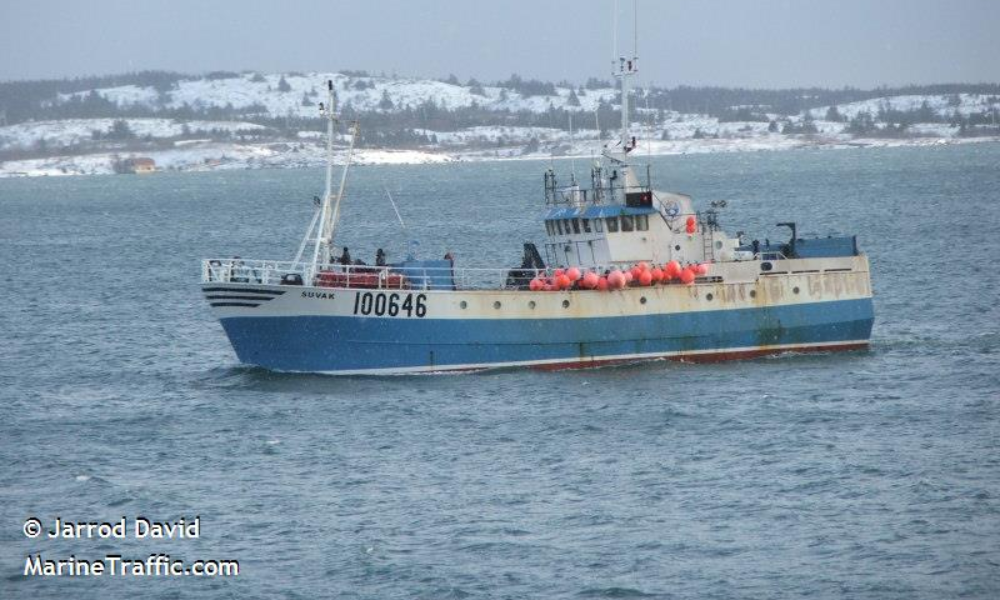TSB highlights 'failure' that 'unnecessarily exposes crews to workplace safety hazards'

There is no oversight and enforcement of occupational health and safety regulations on commercial fishing vessels in Canada’s northern territories, and the Transportation Safety Board of Canada (TSB) is calling on the federal and territorial governments to stop pointing fingers and fill the gap.
“Transport Canada feels it's not their jurisdiction to oversee workplace safety for commercial fishing, because it's a provincial responsibility,” explains Kathy Fox, chair of the TSB, “but then you've got the territories where this vessel was registered and where other vessels are registered, who say well, it's not our jurisdiction, it’s Transport Canada. So bottom line is there's no effective oversight of occupational health and safety.”
Death on the Suvak
The TSB is blowing the horn on the lack of OHS oversight in Yukon, Northwest Territories, and Nunavut following an investigation into the death of a crew member who was pulled overboard from the fishing vessel Suvak in Davis Strait, Nunavut.
On August 26, 2021, as the Suvak was concluding a two-week fishing trip, when a crew member was pulled overboard after becoming entangled in a buoy line while setting nets. The investigation discovered critical risks related to the lack of fatigue management plans and an absence of risk assessment in operating procedures, and a lack of safety equipment, such as a knife readily available to cut the rope.
Two crew members responsible for setting the nets had been awake for more than 21 consecutive hours and had only taken a 1.75-hour break. Their sleep-related fatigue resulted from acute and chronic sleep disturbances, continuous wakefulness, and circadian rhythm disruptions, which compromised their cognitive abilities and alertness to risk.
Jason Melvin, a TSB regional senior investigator, says "the nature of this occurrence was due to the procedures the crew members were using, which contributed to the entanglement. Occupational health and safety should evaluate whether the procedures are safe for workers and if any workplace hazards exist."
No OHS oversight in the territories
But no regulatory body is inspecting workplace safety procedures and hazards on fishing vessels in the territories.
"The Suvak investigation highlights unresolved concerns about safety management, fatigue management, and regulatory oversight, which are three key systemic safety issues in the commercial fishing industry that are on the TSB Watchlist,” says Fox.
“Transport Canada, Employment and Social Development Canada, and territorial governments need to improve oversight of occupational health and safety of fishing vessels registered in the territories. This failure unnecessarily exposes crews to workplace safety hazards."
Transport Canada plays a crucial role in regulating commercial fishing safety, including providing a national regulatory framework, and it has been delegated responsibility for the administration and enforcement of the Marine Occupational Health and Safety Regulations by Employment and Social Development Canada, which is reponsible for the application of the Canada Labour Code, Part II.
Territorial governments consider fishing vessels to be under Transport Canada's jurisdiction. However, Transport Canada does not currently oversee OHS inspections on these vessels, creating a gap in OHS oversight.
"The coordinated and harmonized approach between federal and territorial authorities would significantly improve the occupational health and safety of fishing vessels," notes Fox.
The TSB has recommended the Department of Transport, in collaboration with the Department of Employment and Social Development and the territorial governments, review occupational health and safety oversight on board territorially registered fishing vessels to ensure effective oversight of workplace safety.
The TSB expects responses from the federal ministers and the territorial governments within 90 days, outlining the actions they plan to take to address the safety deficiencies identified in the recommendations. The urgency lies in closing the gap in OHS oversight in Canada's northern territories, ultimately safeguarding the well-being of those working on fishing vessels in these regions.





